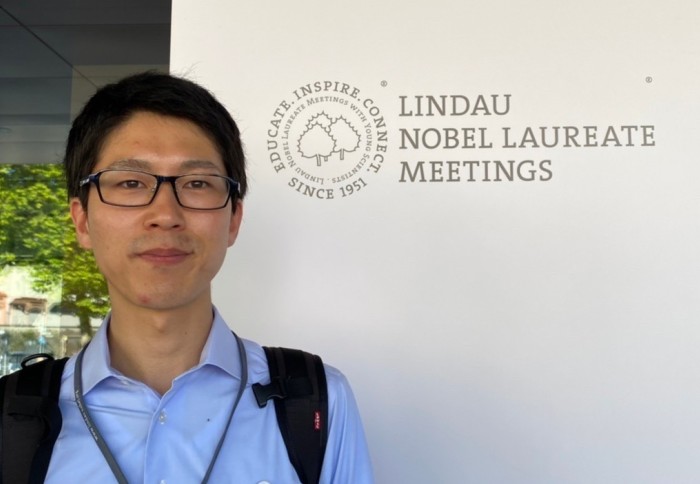Young Imperial scientists attend prestigious Nobel meeting
by Helen Wilkes

Dr Koichi Sasaki at the Lindau Nobel Laureate Meeting
Dr Koichi Sasaki from the Department of Bioengineering recently attended the 71st Lindau Nobel Laureate Meeting in Lindau, Germany.
The Lindau Nobel Laureate Meeting is an annual scientific conference which brings together Nobel Laureates with early-career researchers in order to share ideas, experiences and cultures across disciplines. Koichi was joined by Bowen Ding from the Department of Chemistry - we caught up with Koichi to hear about his experience.
How were you selected to attend the meeting?
I was selected in a two-step process by Japan Society for the Promotion of Science and the Council for the Lindau Nobel Laureate Meeting.
What are you currently working on and how was this represented at the meeting?
While the focus of this year's meeting was chemistry, it was also attended by a number of physiology and medicine award winners, and it was an unforgettable experience to hear much of what was relevant to my current work in mammalian cell engineering and cancer immunotherapy.
At the opening ceremony, when the participating Nobel Laureates and their partners stood up and were applauded, I felt goose-bumps all over my body and almost cried because I was so overwhelmed with emotion that this was really happening.

What activities did you take part in at the meeting and what were your highlights?
My highlights were Professor Ben Feringa’s talk, ranging from his early life to a grand research vision, to encouragement for young scientists and Professor Venki Ramakrishnan’s personal story about the ribosome race. Both were extremely insightful and inspirational to young researchers like me, as they were not the type of researchers who were born into an elite background and had been at top research institutions from the beginning of their careers.
I had the privilege to take a walk with Professor William Kaelin and about ten young scientists within the island of Lindau. During the walk, Professor Kaelin frankly shared his top tips about doing good science and how to be a highly supportive PI by aligning the PI’s own interests with that of lab members, as well as the career stages of the members. In his lecture about his work on von Hippel-Lindau tumor suppressor gene which took place later, he said that seeing patients feeling better as a result of his research and receiving messages of gratitude was more rewarding than being awarded the Nobel Prize, which made me feel that his way of thinking and his personality enabled him to do great research that led to the prize.
The scientific exchange was one of the most interactive events of the meeting, where a laureate is assigned to a room and has interactive discussions with young scientists. Among the discussions I participated in, one with Professor Aaron Ciechanover was particularly exciting. His growing passion and interest for science including mentoring, prejudice in scientific publications and personalized medicine was inspiring and stimulating for young researchers and a catalyst for behavioural change.
Article text (excluding photos or graphics) © Imperial College London.
Photos and graphics subject to third party copyright used with permission or © Imperial College London.
Reporter
Helen Wilkes
Faculty of Engineering